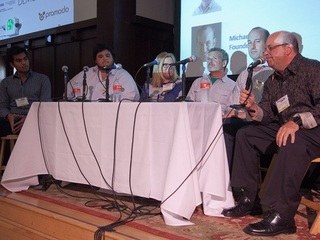What digital health trends are VCs embracing and ignoring?
VCs from Canvas Ventures, McKesson Ventures, Sequoia Capital, Xfund at Splash Health 2017
Read more...What's the biggest impace to seed- to early-stage investing these days? That was the driving question for this panel of early-stage investors, including Renata Quintini, partner at Felicis Ventures, Dave McClure, partner at 500 Startups, Paul Lee, partner at Lightbank and Cindy Padnos, partner at Illuminate Ventures. Alastair Goldfisher, Editor of Thomson Reuter's Venture Capital Journal was the moderator.
The panelists spoke at The Ritz in Half Moon Bay, at Amplify, an event focused on empowering females to take more leadership roles in the high-tech startup and venture ecosystem. Amplify is produced by Vator, Girls in Tech, and was hosted by Thomson Reuters.
Here's some highlights (answers are consolidated and slightly edited):
When asked to define their firm:
Felicis Ventures was founded in 2006. It manages $110 million. They view their role as backing iconic companies of today and tomorrow. Their focus is on sectors that are seeing high growth, irrespective of stage and geography. There are 20 female founders in their portfolio.
500 Startups has $80 million under management. But the company has already invested in nearly 600 startups in the last three years. About 15% are women CEOs, 25% to 30% are female co-founders/founders. The seed-stage firm has also backed more than 20 married couples.
Lightbank is a $200 million early-stage fund. It typically looks outside of Silicon Valley because the firm believes there's too much money in the Valley already and that great firms can be built everywhere. "We think there's a misallocation of venture dollars relative to entrepreneurs," said Lee.
Illuminate Ventures is a micro-VC firm that launched in 2009. The firm recently raised a $20 million fund. It focuses primarily on B2B, cloud and mobile.
What's the biggest impace to early-stage investing?
Seed companies are raising larger rounds compared to a year or two ago and the number of seed-stage companies has increased. More people are starting their own funds, creating a structural shift in how companies get funded. More consumer Internet investors are starting to look at enterprise investments. There's too much money in Silicon Valley, though there seems to be a scarcity of capital around the world and possibly across the country. Seed-stage investing is still a local phenomenon.
How important is it for the VC firm to help their portfolio companies raise a Series A?
McClure: 500 Startups is active in Brazil, Southeast Asia, Mexico and China. The firm has to be cognizant of "downstream" capital for their companies because follow-on capital is not often easy to come by. For instance, there are only two active firms in Mexico, and 500 Startups is invested in one of them. This is a strategy to help its downstream partners, and ultimately its own portfolio. At times, 500 Startups will provide $250k to $500k in a bridge loan to a Series A. That's not the case in the US.
Watch the video to learn more about what the investors think about funding platforms, as well as how they see the entire venture landscape changing and what technologies they're interested in investing in.

Woman of many skills: Database System Engineer; SplashX event producer; Author of Startup Teams
All author postsVCs from Canvas Ventures, McKesson Ventures, Sequoia Capital, Xfund at Splash Health 2017
Read more...At Post Seed 2016, Founders and Partners discussed about Post Seed and Small A Round
Read more...At Post Seed 2016, CEOs and Partners talked about the size of their funds and investment
Read more...
Joined Vator on

Joined Vator on

Joined Vator on
Cindy Padnos is founder/managing partner of Illuminate Ventures, an early stage VC firm focused on enterprise cloud and mobile computing. A prior founder herself, she is an entrepreneurial enthusiast!
Joined Vator on
Partner at Felicis Ventures, investing in disruptive technology companies.


